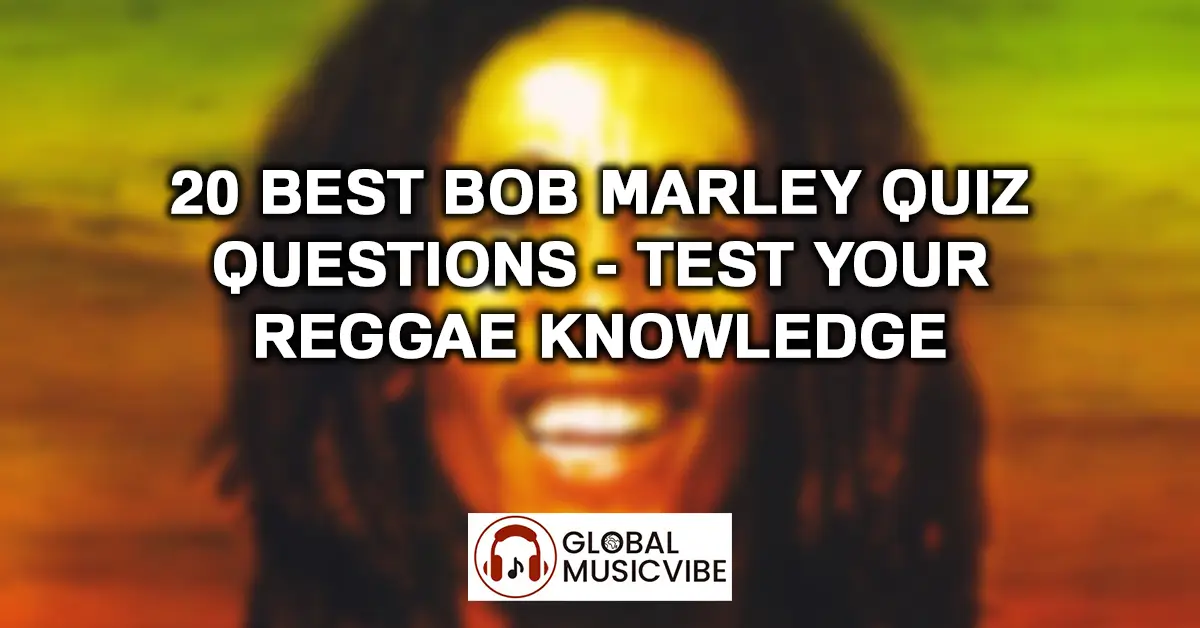Welcome to the ultimate Bob Marley quiz! Test your knowledge about the legendary reggae king with 20 comprehensive questions covering his iconic songs, albums, Rastafarian beliefs, and musical legacy. This Bob Marley trivia challenge will take you through his revolutionary music, spiritual journey, and the cultural impact that made him a global icon.
Whether you’re a reggae enthusiast or discovering Bob Marley’s genius, these carefully crafted questions span his major hits, philosophical messages, band history, and biographical details. Discover fascinating facts about the musician who brought reggae to the world and spread messages of love, unity, and social justice.
Instructions: Take your time with each question and enjoy detailed explanations that will deepen your Bob Marley knowledge. How well do you really know the King of Reggae?
Your Score: 0/20
Your Bob Marley Quiz Journey
From Nine Mile to Global Icon
This Bob Marley quiz journey explored the extraordinary life of reggae’s greatest ambassador. Born Robert Nesta Marley in Nine Mile, Saint Ann Parish, Jamaica, his path from rural farming community to global superstar demonstrates the power of music to transcend boundaries. His mentorship under Joe Higgs and evolution from The Teenagers to The Wailers shaped his artistic foundation.
Understanding Bob Marley’s early career and tragic death at age 36 provides context for his incredible impact during his brief but influential life. His connection to Jamaica’s musical roots and Trench Town’s cultural environment influenced both his sound and social consciousness.
Musical Breakthrough and Timeless Songs
Bob Marley’s albums represent the evolution of reggae from local Jamaican music to global phenomenon. “Catch a Fire” marked his international breakthrough, while songs like “Three Little Birds,” “No Woman No Cry,” and “Redemption Song” showcase his ability to blend personal experience with universal themes of hope and liberation.
His final album “Uprising” demonstrated his artistic maturity, containing powerful messages about love, resistance, and spiritual awakening. These songs continue to inspire new generations and maintain their relevance in contemporary social movements.
Rastafarian Faith and Philosophy
Bob Marley’s deep Rastafarian beliefs permeated his music and worldview, with references to Jah, Haile Selassie I, and the symbolic meanings of red, gold, and green colors. His spiritual opposition to “Babylon” represented resistance to oppression while promoting African consciousness and spiritual liberation.
His participation in Groundation ceremonies and Rastafarian reasoning sessions influenced his philosophical outlook and musical messages. This spiritual foundation gave his music authenticity and power that resonated far beyond entertainment value.
Enduring Legacy and Global Impact
Bob Marley’s influence extends far beyond music, earning him posthumous recognition including the Rock and Roll Hall of Fame induction in 1994 and the UN’s Peace Medal of the Third World. His 11 acknowledged children continue his musical legacy, with many becoming successful musicians in their own right.
“One Love” being named “Song of the Millennium” by the BBC demonstrates the universal appeal of his message. His home at 56 Hope Road, now a museum, preserves his memory for future generations while his music continues to promote unity and social justice worldwide.
Bob Marley’s legacy proves that music can be a powerful force for positive change, spreading messages of love, unity, and resistance that remain as relevant today as they were during his lifetime.
Continue Your Musical Discovery Journey
Congratulations on completing the ultimate Bob Marley quiz! Your exploration of his life, music, spiritual beliefs, and lasting impact demonstrates the kind of appreciation that makes studying music history so rewarding—there’s always more to discover about musical legends and their cultural influence.
Whether you’re a reggae enthusiast or newly discovering Bob Marley’s genius, remember that his messages of love, unity, and social justice continue to inspire positive change worldwide, proving that great music truly transcends time and cultural boundaries.
Frequently Asked Questions About Bob Marley Quiz
How many questions are in this Bob Marley quiz?
This comprehensive Bob Marley quiz contains 20 carefully crafted questions covering his life, music, Rastafarian beliefs, and lasting impact on reggae and world culture.
What topics does the Bob Marley quiz cover?
The quiz covers four main categories: Early Life & Career, Albums & Famous Songs, Rastafari & Philosophy, and Legacy & Impact, providing a complete overview of the reggae legend’s life and influence.
Is this Bob Marley quiz suitable for beginners?
Yes! The quiz is designed for both reggae enthusiasts and those newly discovering Bob Marley’s music, with detailed explanations for each answer to enhance your knowledge.
Can I retake the Bob Marley quiz?
Absolutely! You can take the quiz multiple times to improve your score and learn more about Bob Marley’s incredible musical and spiritual journey.
What makes Bob Marley such an important musical figure?
Bob Marley revolutionized reggae music, spreading messages of love, unity, and social justice worldwide while introducing Rastafarian culture to a global audience through his powerful songs and performances.

